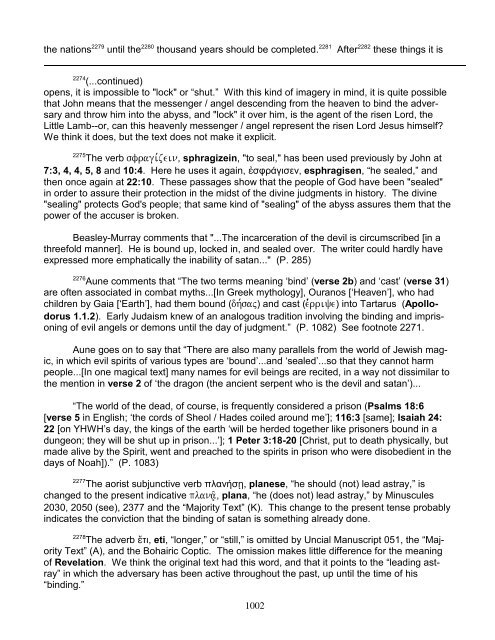Revelation 20 - In Depth Bible Commentaries
Revelation 20 - In Depth Bible Commentaries
Revelation 20 - In Depth Bible Commentaries
Create successful ePaper yourself
Turn your PDF publications into a flip-book with our unique Google optimized e-Paper software.
2279 2280 2281 2282<br />
the nations until the thousand years should be completed. After these things it is<br />
2274<br />
(...continued)<br />
opens, it is impossible to "lock" or “shut.” With this kind of imagery in mind, it is quite possible<br />
that John means that the messenger / angel descending from the heaven to bind the adversary<br />
and throw him into the abyss, and "lock" it over him, is the agent of the risen Lord, the<br />
Little Lamb--or, can this heavenly messenger / angel represent the risen Lord Jesus himself?<br />
We think it does, but the text does not make it explicit.<br />
2275<br />
The verb sfragi,zein, sphragizein, "to seal," has been used previously by John at<br />
7:3, 4, 4, 5, 8 and 10:4. Here he uses it again, óöñÜãéóåí, esphragisen, “he sealed,” and<br />
then once again at 22:10. These passages show that the people of God have been "sealed"<br />
in order to assure their protection in the midst of the divine judgments in history. The divine<br />
"sealing" protects God's people; that same kind of "sealing" of the abyss assures them that the<br />
power of the accuser is broken.<br />
Beasley-Murray comments that "...The incarceration of the devil is circumscribed [in a<br />
threefold manner]. He is bound up, locked in, and sealed over. The writer could hardly have<br />
expressed more emphatically the inability of satan..." (P. 285)<br />
2276<br />
Aune comments that “The two terms meaning ‘bind’ (verse 2b) and ‘cast’ (verse 31)<br />
are often associated in combat myths...[<strong>In</strong> Greek mythology], Ouranos [‘Heaven’], who had<br />
children by Gaia [‘Earth’], had them bound (dh,saj) and cast (ev ,rriye) into Tartarus (Apollodorus<br />
1.1.2). Early Judaism knew of an analogous tradition involving the binding and imprisoning<br />
of evil angels or demons until the day of judgment.” (P. 1082) See footnote 2271.<br />
Aune goes on to say that “There are also many parallels from the world of Jewish magic,<br />
in which evil spirits of various types are ‘bound’...and ‘sealed’...so that they cannot harm<br />
people...[<strong>In</strong> one magical text] many names for evil beings are recited, in a way not dissimilar to<br />
the mention in verse 2 of ‘the dragon (the ancient serpent who is the devil and satan’)...<br />
“The world of the dead, of course, is frequently considered a prison (Psalms 18:6<br />
[verse 5 in English; ‘the cords of Sheol / Hades coiled around me’]; 116:3 [same]; Isaiah 24:<br />
22 [on YHWH’s day, the kings of the earth ‘will be herded together like prisoners bound in a<br />
dungeon; they will be shut up in prison...’]; 1 Peter 3:18-<strong>20</strong> [Christ, put to death physically, but<br />
made alive by the Spirit, went and preached to the spirits in prison who were disobedient in the<br />
days of Noah]).” (P. 1083)<br />
2277<br />
The aorist subjunctive verb ðëáíÞó, planese, “he should (not) lead astray,” is<br />
changed to the present indicative plana|/, plana, “he (does not) lead astray,” by Minuscules<br />
<strong>20</strong>30, <strong>20</strong>50 (see), 2377 and the “Majority Text” (K). This change to the present tense probably<br />
indicates the conviction that the binding of satan is something already done.<br />
2278<br />
The adverb ôé, eti, “longer,” or “still,” is omitted by Uncial Manuscript 051, the “Majority<br />
Text” (A), and the Bohairic Coptic. The omission makes little difference for the meaning<br />
of <strong>Revelation</strong>. We think the original text had this word, and that it points to the “leading astray”<br />
in which the adversary has been active throughout the past, up until the time of his<br />
“binding.”<br />
1002

















